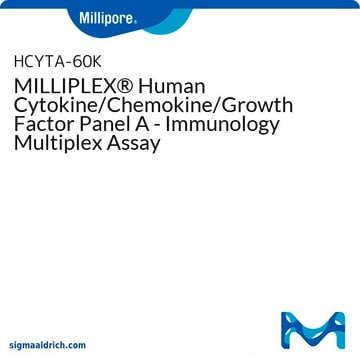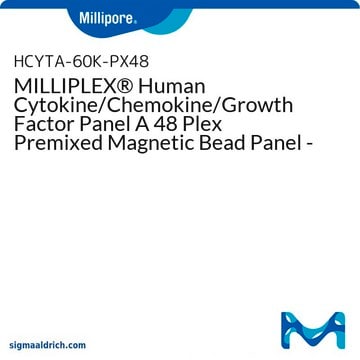HSP1MAG-63K
MILLIPLEX® Human Sepsis Magnetic Bead Panel 1 - Immune Response Multiplex Assay
Inflammation/Immunology Bead-Based Multiplex Assays using the Luminex technology enables the simultaneous analysis of multiple sepsis biomarkers in human serum, plasma and cell culture samples.
About This Item
Recommended Products
Quality Level
species reactivity
human
manufacturer/tradename
Milliplex®
assay range
accuracy: 111%
(sVCAM-1)
accuracy: 114%
(MIF)
accuracy: 98%
(sFas)
standard curve range: 12-50,000 pg/mL
(sFas, sFasL, and PAI-1)
standard curve range: 61-250,000 pg/mL
(sVCAM-1 and sICAM-1)
technique(s)
multiplexing: suitable
detection method
fluorometric (Luminex xMAP)
shipped in
wet ice
General description
MILLIPLEX® Human Sepsis Panel 1 is to be used for the simultaneous quantification of any or all of the following analytes in human serum, plasma and cell / tissue culture supernatant samples: sFAS/TNFRSF6, sFasL, sICAM-1, MIF, PAI-1 (total), sVCAM-1. This kit uses a 96-well format, contains a lyophilized standard cocktail, two internal assay quality controls and can measure up to 38 samples in duplicate.
The Luminex® xMAP® platform uses a magnetic bead immunoassay format for ideal speed and sensitivity to quantitate multiple analytes simultaneously, dramatically improving productivity while conserving valuable sample volume.
Panel Type: Immune Response
Application
- Analytes: MIF, PAI-1 (Total), sFas, sFasL, sICAM-1, sVCAM-1
- Recommended Sample type: Serum, plasma, tissue culture, or homogenates
- Recommended Sample dilution: 1:10 for serum/plasma
- Assay Run Time: Overnight
- Research Category: Inflammation & Immunology
Features and Benefits
Other Notes
Standard Curve Range: Refer to QC analysis sheet for exact concentration (MIF).
Legal Information
Signal Word
Warning
Hazard Statements
Precautionary Statements
Hazard Classifications
Acute Tox. 4 Dermal - Acute Tox. 4 Inhalation - Acute Tox. 4 Oral - Aquatic Chronic 2 - Eye Irrit. 2 - Skin Irrit. 2 - Skin Sens. 1 - STOT SE 3
Target Organs
Respiratory system
Storage Class Code
10 - Combustible liquids
Certificates of Analysis (COA)
Search for Certificates of Analysis (COA) by entering the products Lot/Batch Number. Lot and Batch Numbers can be found on a product’s label following the words ‘Lot’ or ‘Batch’.
Already Own This Product?
Find documentation for the products that you have recently purchased in the Document Library.
Related Content
See how multiplexing the inflammation signaling pathway with MILLIPLEX® inflammation assays or cell signaling assays can help researchers bridge the gap between immunology and cell signaling, including investigating T cell signaling, Th Cell differentiation, inflammatory response signaling, and sepsis signaling.
See how multiplexing the inflammation signaling pathway with MILLIPLEX® inflammation assays or cell signaling assays can help researchers bridge the gap between immunology and cell signaling, including investigating T cell signaling, Th Cell differentiation, inflammatory response signaling, and sepsis signaling.
See how multiplexing the inflammation signaling pathway with MILLIPLEX® inflammation assays or cell signaling assays can help researchers bridge the gap between immunology and cell signaling, including investigating T cell signaling, Th Cell differentiation, inflammatory response signaling, and sepsis signaling.
See how multiplexing the inflammation signaling pathway with MILLIPLEX® inflammation assays or cell signaling assays can help researchers bridge the gap between immunology and cell signaling, including investigating T cell signaling, Th Cell differentiation, inflammatory response signaling, and sepsis signaling.
Our team of scientists has experience in all areas of research including Life Science, Material Science, Chemical Synthesis, Chromatography, Analytical and many others.
Contact Technical Service










